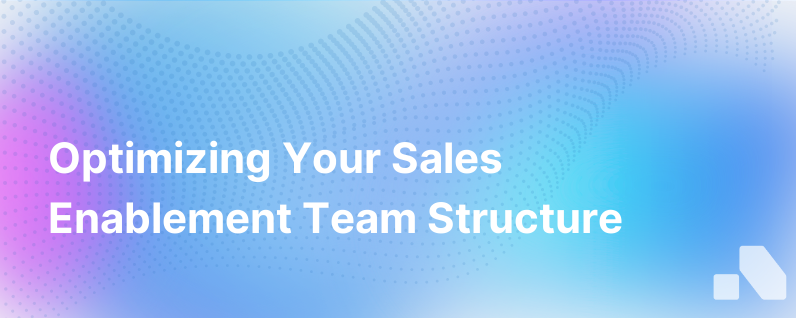Sales Enablement Team Structure
Published on September 25, 2023 by David Zhang
Creating a robust sales enablement function is more of a necessity than a luxury in today’s competitive marketplaces, where the difference between winning and losing a deal often boils down to which sales team is better equipped. Sales enablement, when structured effectively, can make a significant positive impact on sales productivity and success.
In this comprehensive guide, we will explore the key considerations and recommendations for structuring a sales enablement team that empowers your sales force to perform at their peak.
Understanding Sales Enablement
Before we dive into the team structure, let’s understand what sales enablement is. Sales enablement is a strategic, ongoing process that equips all client-facing employees with the ability to consistently and systematically have valuable conversations with the right set of customer stakeholders at each stage of the customer's problem-solving life cycle.
Top Considerations for Sales Enablement Team Structure
A well-structured sales enablement team can be pivotal for aligning sales and marketing efforts, ensuring only the most relevant and potent content reaches your sales team and, ultimately, your prospects.
Here are some critical considerations for shaping your sales enablement team:
Clear Ownership and Leadership
Sales enablement functions best when there's clear leadership in place. This role typically oversees the cross-functional coordination among various departments like marketing, product, sales, and customer success.
Cross-functional Coordination
The sales enablement team must have members who liaison well with other departments. This ensures that the team is not working in silos but rather in a synergistic manner.
Scalability
As your business grows, so should your sales enablement efforts. The structure should allow for addition of staff and resources without a drop in effectiveness.
Adaptability
Adaptable team members are essential. Sales enablement is about staying ahead of trends and continuously improving sales processes.
Technology Expertise
Sales enablement teams often work closely with sales technology platforms. This demands proficiency in various digital tools for content management, CRM, analytics, learning management systems, and communication.
Training and Coaching
Any structure needs to include personnel who can assess skill gaps and deliver ongoing training and coaching.
Measurable Impact
Lastly, team members must be committed to measuring the success of sales enablement initiatives and making data-driven decisions to iterate and improve upon those strategies.
Recommended Sales Enablement Team Structure
Now let's examine the pivotal components for an optimal sales enablement team structure:
Head of Sales Enablement
At the helm is the Head of Sales Enablement or Director of Sales Enablement, who sets the strategic direction. They are typically responsible for defining the overarching goals and KPIs, managing the budget, and ensuring alignment with the broader sales and business objectives.
Sales Enablement Managers
These are the team members who oversee the deployment of strategies on various fronts. Sales Enablement Managers may focus on specific areas such as content management, sales training, or performance analytics.
Content Managers
Content Managers are tasked with ensuring the sales team has access to up-to-date, relevant, and persuasive sales materials. They coordinate with the marketing department to ensure messaging is consistent and tailored for the sales process.
Training and Development Specialists
These professionals develop and manage training programs to hone the skills of the sales team. They oversee onboarding new sales reps and provide ongoing development and coaching.
Sales Technology Specialists
Sales Technology Specialists manage and optimize the tools that enable the sales force to engage effectively with prospects. This includes CRM systems, communication platforms, and any proprietary sales enablement software.
Enablement Operations Analyst
An Enablement Operations Analyst (or multiple analysts, depending on the size of the company) works behind the scenes to manage data, processes, and systems. They are critical in identifying areas for process improvement and strategic decision-making based on data analysis.
Front-line Enablement Coaches
These are subject-matter experts who closely interact with the sales team. They are responsible for reinforcing training, ensuring adoption of sales processes, and offering on-the-ground coaching to sales reps.
Support Roles
While not always considered part of the core sales enablement team, roles such as administrative assistants, technical support specialists, and project managers play a vital role in maintaining the workflow and supporting the implementation of various initiatives.
Ensuring Synergy and Collaboration
While it’s essential to have dedicated roles within the sales enablement team, the silo mentality must be avoided. It's crucial that:
- Team members have a shared vision and are aligned towards common goals.
- There’s a constant flow of communication between the enablement team and sales reps.
- The team collaborates effectively with the marketing department to ensure content is consistent and powerful.
- There's openness to feedback from the sales team – their insights are key to continuously improving the enablement process.
Measuring Success
To ensure your sales enablement team is delivering value, you’ll need the right tools and processes in place to measure success. Metrics to consider include:
- Sales cycle lengths
- Win rates
- Quota attainment percentages
- Usage of sales materials
- Training completion rates
- Feedback from sales reps on effectiveness
Conclusion
Creating a structured sales enablement team is more than just filling roles; it’s about aligning each member’s efforts toward a cohesive strategy that empowers the sales team. Remember that the bedrock of a successful team is ongoing communication and cooperation across departments.
AI tools like Aomni assist in real-time account research, competitive insights, and personalized sales content to support your sales enablement efforts. These tools become a force multiplier for your carefully planned and executed sales enablement strategy, further empowering your sales team to close more deals effectively and efficiently.